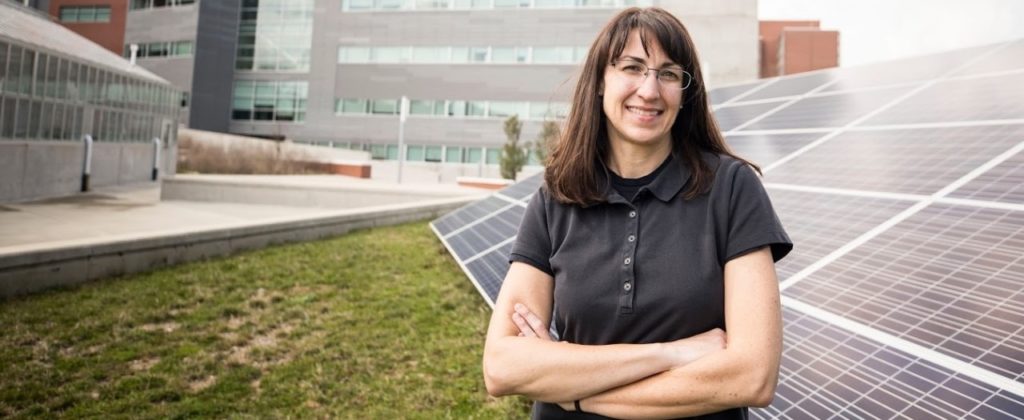
RICHMOND, Ky. — Eastern Kentucky University is set to become a statewide leader in solar energy within the next few years. This is thanks in part to Judy Jenkins, assistant professor in the chemistry department. Jenkins’ project, for which she earned an EKU Innovation Fund Award, will enhance the University’s infrastructure to incorporate solar energy and provide educational research platforms for students.
“If we could capture all of the sunlight that makes it to Earth’s surface in one hour, and if we could convert all of that energy to electricity with 100% efficiency, we could power the whole planet for an entire year. Harnessing sunlight to meet our energy needs makes sense on so many levels,” said Jenkins. “I’m encouraged and excited by the ways we are putting the energy in sunlight to work here on campus.”
As part of a novel partnership, the University will lease around 1,000 solar panels from a local business owned by EKU alum Gary Booth. However, campus facilities are in need of upgrades to get power from the panels to existing infrastructure.
“We have to connect the panels to our grid. You could think of this infrastructure like a really long extension cord,” Jenkins explained. “The labor and hardware required to make and install that fancy extension cord are expensive.”
- IT’S FREE | Sign up for The Lane Report email business newsletter. Receive breaking Kentucky business news and updates daily. Click here to sign up
The Innovation Fund award will contribute to those efforts. Ultimately, the project will allow the University to reduce its reliance on fossil fuels, saving money and reducing greenhouse gas emissions. While this project is campus-focused, there’s a reason Jenkins was chosen to lead it — she is continually researching potential advances in solar energy that could benefit the world at large.
“I’m a chemist by training and so I’m more comfortable working with atoms and molecules than with full, grid-scale power. However, I hope my research will ultimately contribute to new solar technologies, and I’m happy to help us implement panels that are grid-ready today,” she said.
Currently, she’s working on a project that would convert sunlight into a clean fuel, such as hydrogen gas, so that energy from sunlight can be stored and then used after the sun has gone down. She is also working with students to make and use semiconducting polymers for organic solar cells, which would be cheaper and energetically easier to manufacture than traditional solar panels.
Engaging students in research is the most exciting part of Jenkins’ job, she said, and the campus project funded by her Innovation Fund has the potential to teach students real-world skills. Once the new solar grid is up and running, “we could have students involved in monitoring how much power is generated, tracking what we’re doing with that power, and communicating how much greenhouse gas emission has been offset by the array.”
Already, students are getting hands-on with solar panels on a smaller scale. The Science Building houses 125 solar panels on its roof and 25 near its adjacent greenhouse, most of which were also donated by Booth. Students have responded positively to their presence and have used them as an educational tool. “Gary’s leadership has been a great example for all of us,” Jenkins said. “We’re so grateful for these arrays and the scholarships they fund.”
The experiential aspect of an EKU education, Jenkins said, is one of the most valuable experiences for students.
“Getting students in our research labs is one of the best opportunities we have to offer, because it gives them the chance to try out what they could do after graduating from EKU,” said Jenkins. “Research connects the dots between what students learn in the classroom and how they can use that knowledge to positively impact the world.”
This story appeared in the Fall 2019 issue of EKU Magazine. Read the full issue.



















Add Comment